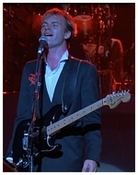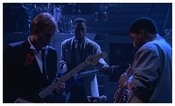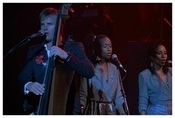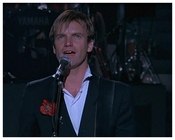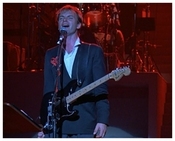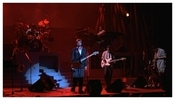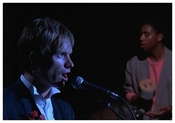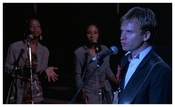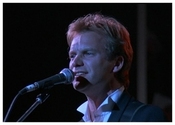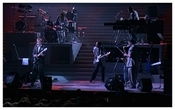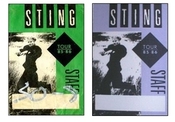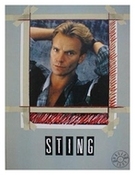
Sting melds old persona with new band escaping from the Police...
With his face on everything from Gentleman's Quarterly to newspaper ads for his latest film, 'The Bride,' Gordon Sumner, a.k.a. Sting, may seem little more than a cool, distant, even pretentious image.
But Friday night at the Greek Theatre, the once (and future?) lead singer of the semi-retired Police and his new six-piece band played a two-hour set that revealed much more than his picture-perfect persona and ambitious recordings have let us see.
He did it with a terrific band, diverse songs and a loose, engaging presence.
The casual, unpretentious way he interacted with the crowd was a pleasure. Make no mistake, he is aware of his appeal and status, and he used age-old show-biz ploys to woo the crowd, but he used them subtly and intelligently, to everyone's benefit.
He joked about the flowers and clothes people threw on stage, teased the crowd about song requests, and during one song introduction answered one of many screams with 'How can you love me? You don't even know me!' His art is that he can ask that question, after all the time he has spent trying to gain just that attention, and seem genuinely nonplussed.
But though the teeny boppers were audibly present, many of Sting's fans have been with him since the Police broke through six years ago, blending reggae, New Wave and pop styles with jazz skills and an avant-garde sensibility. Those fans were there to hear the latest development in what has become one of the more interesting careers in rock.
A major factor in Sting's fledgling post-Police career is his new band, composed of four of jazz's most respected young musicians. With Sting moving from bass to guitar, the group features bassist Darryl Jones, drummer Omar Hakim, pianist Kenny Kirkland and saxophonist Branford Marsalis. Along for the tour were singers Janice Pendarvis and Dolette McDonald, who has toured in the same capacity with Talking Heads.
Sting gave the band plenty to work with by rearranging songs, extending many with instrumental interludes, adding false endings to several others and creating unexpected medleys such as the seamless fusion of the new 'Love is the Seventh Wave' with the Police's 'One World (Not Three)'.
The band rose to the challenge. Powerful Hakim had a remarkable pyrotechnicshowcase during the climax of 'I Burn for You' and Jones' deep grooves showed the influence of previous boss Miles Davis. Unfortunately, his bass was consistently too loud and distorted.
Kirkland was fine throughout, his prodigous keyboard skills put to use on synthesizers, organ and piano, but his talents are still best served in the relatively uncluttered acoustic setting of his musical alma mater, the Wynton Marsalis quintet. Another Marsalis alumni, brother Branford, survived the! electronics better, cutting through the sound with his sweet, imaginative lines, most of them played on a soprano sax.
Sting's fine voice sounded a bit strained in the higher registers, particularly on 'Shadows', the chorus of 'We Work the Black Seam' and the emotional climax of 'Moon Over Bourbon Street', and his work with the backing singers fell short of the harmonies he creates in the recording studio.
At some points he seemed to need to shout over the band, and his guitar work was all but inaudible when the band was playing. But these were minor problems, and when he played a duet with Marsalis on 'Roxanne' or a solo turn on the concert's moving closer, 'Message in a Bottle', complete with jazzy finger picking and chording, he was totally in control and delivered musical magic.
(c) The Sacramento Bee by David Barton
Sting sets them free in Berkeley...
Pop music stardom can be something of a prison. Artistically, it confines as much as it liberates.
A musician struggles for years, finally hits upon a style that is wildly successful and is often stuck with that style, repeating it over and over again for the rest of his musical career.
With his current solo career - the album 'The Dream of the Blue Turtles' and the tour to support it - Sting is breaking out.
With the Police far behind him (for the moment), Sting came to the Greek Theater at the University of California at Berkeley Friday for the first of two sold-out shows. From the first note to the last, he seemed intent on freeing himself and his fans from any preconceived musical notions - a risky effort that few stars of his magnitude ever attempt, and one that yielded stunning rewards.
The show seemed to be a compilation of everything that Sting always wanted to do musically, but was unable to do with the Police.
Backed by the cream of the emerging jazz crop - including Weather Report drummer Omar Hakim, Miles Davis' bassist Darryl Jones, session stalwart, keyboardist Kenny Kirkland and saxophonist Branford Marsalis.
Sting, a former jazz bassist from Newcastle, England, delved into complex improvisations worthy of the finest jazz ensembles. At other times, he changed course and played and sang the blues with a boisterousness that was infectious. He played guitar, not bass; he played solo and with the group; and he played as part of the group, although he was obviously the centre of attention.
He also played with his songs - old and new - changing and rearranging them in inventive and daring ways. Thus, the Police's 'One World' slid effortlessly into the reggae- inflected 'Love Is The Seventh Wave', from 'Turtles'.
His two current hits, 'Fortress Around Your Heart' and 'If You Love Somebody Set Them Free' were scaled down to lean levels and delivered with a punch and power that the recorded versions only hint at.
The rest of the songs from 'Turtles' were played faithfully, but with occasional jazzy asides that kept the crowd and the musicians constantly on their toes.
The real delight of this show was the fact that both Sting and his listeners seemed to enjoy this challenge. As any true artist must, Sting is evolving and taking his fans with him (it is doubtful that many of the screamers down front had ever heard any form of jazz, but they listened and responded).
And the Star and his fans urged each other on, with the exhilaration that comes from conquering new territory. After an hour and a half, Sting left the stage but was called back for three encores that lasted another hour.
The excitement was electric. And, at the very end of this remarkable night, Sting and the crowd rewarded themselves with a comfy, cosy retreat to the past, a respite from the experimenting. Standing alone onstage, with only his guitar to support him, Sting sang the old Police classic, 'Message in a Bottle'.
But he was not alone. The crowd sang with him, not only on the choruses, but every word. He sang and played quietly as 12,000 voices washed over him, voices filled with emotion and affection and respect. The guitar finally stopped and all that was left was his voice and the 12,000 singing as one and slowly fading. It was one of those rare moments in pop, a moment that sent shivers up every spine in the house.
(c) The San Jose Mercury News by Harry Sumrall
With his face on everything from Gentleman's Quarterly to newspaper ads for his latest film, 'The Bride,' Gordon Sumner, a.k.a. Sting, may seem little more than a cool, distant, even pretentious image.
But Friday night at the Greek Theatre, the once (and future?) lead singer of the semi-retired Police and his new six-piece band played a two-hour set that revealed much more than his picture-perfect persona and ambitious recordings have let us see.
He did it with a terrific band, diverse songs and a loose, engaging presence.
The casual, unpretentious way he interacted with the crowd was a pleasure. Make no mistake, he is aware of his appeal and status, and he used age-old show-biz ploys to woo the crowd, but he used them subtly and intelligently, to everyone's benefit.
He joked about the flowers and clothes people threw on stage, teased the crowd about song requests, and during one song introduction answered one of many screams with 'How can you love me? You don't even know me!' His art is that he can ask that question, after all the time he has spent trying to gain just that attention, and seem genuinely nonplussed.
But though the teeny boppers were audibly present, many of Sting's fans have been with him since the Police broke through six years ago, blending reggae, New Wave and pop styles with jazz skills and an avant-garde sensibility. Those fans were there to hear the latest development in what has become one of the more interesting careers in rock.
A major factor in Sting's fledgling post-Police career is his new band, composed of four of jazz's most respected young musicians. With Sting moving from bass to guitar, the group features bassist Darryl Jones, drummer Omar Hakim, pianist Kenny Kirkland and saxophonist Branford Marsalis. Along for the tour were singers Janice Pendarvis and Dolette McDonald, who has toured in the same capacity with Talking Heads.
Sting gave the band plenty to work with by rearranging songs, extending many with instrumental interludes, adding false endings to several others and creating unexpected medleys such as the seamless fusion of the new 'Love is the Seventh Wave' with the Police's 'One World (Not Three)'.
The band rose to the challenge. Powerful Hakim had a remarkable pyrotechnicshowcase during the climax of 'I Burn for You' and Jones' deep grooves showed the influence of previous boss Miles Davis. Unfortunately, his bass was consistently too loud and distorted.
Kirkland was fine throughout, his prodigous keyboard skills put to use on synthesizers, organ and piano, but his talents are still best served in the relatively uncluttered acoustic setting of his musical alma mater, the Wynton Marsalis quintet. Another Marsalis alumni, brother Branford, survived the! electronics better, cutting through the sound with his sweet, imaginative lines, most of them played on a soprano sax.
Sting's fine voice sounded a bit strained in the higher registers, particularly on 'Shadows', the chorus of 'We Work the Black Seam' and the emotional climax of 'Moon Over Bourbon Street', and his work with the backing singers fell short of the harmonies he creates in the recording studio.
At some points he seemed to need to shout over the band, and his guitar work was all but inaudible when the band was playing. But these were minor problems, and when he played a duet with Marsalis on 'Roxanne' or a solo turn on the concert's moving closer, 'Message in a Bottle', complete with jazzy finger picking and chording, he was totally in control and delivered musical magic.
(c) The Sacramento Bee by David Barton
Sting sets them free in Berkeley...
Pop music stardom can be something of a prison. Artistically, it confines as much as it liberates.
A musician struggles for years, finally hits upon a style that is wildly successful and is often stuck with that style, repeating it over and over again for the rest of his musical career.
With his current solo career - the album 'The Dream of the Blue Turtles' and the tour to support it - Sting is breaking out.
With the Police far behind him (for the moment), Sting came to the Greek Theater at the University of California at Berkeley Friday for the first of two sold-out shows. From the first note to the last, he seemed intent on freeing himself and his fans from any preconceived musical notions - a risky effort that few stars of his magnitude ever attempt, and one that yielded stunning rewards.
The show seemed to be a compilation of everything that Sting always wanted to do musically, but was unable to do with the Police.
Backed by the cream of the emerging jazz crop - including Weather Report drummer Omar Hakim, Miles Davis' bassist Darryl Jones, session stalwart, keyboardist Kenny Kirkland and saxophonist Branford Marsalis.
Sting, a former jazz bassist from Newcastle, England, delved into complex improvisations worthy of the finest jazz ensembles. At other times, he changed course and played and sang the blues with a boisterousness that was infectious. He played guitar, not bass; he played solo and with the group; and he played as part of the group, although he was obviously the centre of attention.
He also played with his songs - old and new - changing and rearranging them in inventive and daring ways. Thus, the Police's 'One World' slid effortlessly into the reggae- inflected 'Love Is The Seventh Wave', from 'Turtles'.
His two current hits, 'Fortress Around Your Heart' and 'If You Love Somebody Set Them Free' were scaled down to lean levels and delivered with a punch and power that the recorded versions only hint at.
The rest of the songs from 'Turtles' were played faithfully, but with occasional jazzy asides that kept the crowd and the musicians constantly on their toes.
The real delight of this show was the fact that both Sting and his listeners seemed to enjoy this challenge. As any true artist must, Sting is evolving and taking his fans with him (it is doubtful that many of the screamers down front had ever heard any form of jazz, but they listened and responded).
And the Star and his fans urged each other on, with the exhilaration that comes from conquering new territory. After an hour and a half, Sting left the stage but was called back for three encores that lasted another hour.
The excitement was electric. And, at the very end of this remarkable night, Sting and the crowd rewarded themselves with a comfy, cosy retreat to the past, a respite from the experimenting. Standing alone onstage, with only his guitar to support him, Sting sang the old Police classic, 'Message in a Bottle'.
But he was not alone. The crowd sang with him, not only on the choruses, but every word. He sang and played quietly as 12,000 voices washed over him, voices filled with emotion and affection and respect. The guitar finally stopped and all that was left was his voice and the 12,000 singing as one and slowly fading. It was one of those rare moments in pop, a moment that sent shivers up every spine in the house.
(c) The San Jose Mercury News by Harry Sumrall

